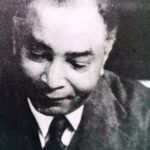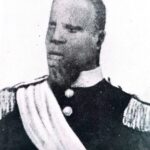SMART, CHARLES
- 4 Min Read
Charles Smart (18?-circa early 1900s) was an ambitious member of the Loko Smart family which held a high position in Mahera, near the mouth of the Rokel River, Sierra Leone.
In his determination to be free of Temne Koya overlordship, Smart threw in his lot with the colonial administration and sought ruthlessly and successfully to overthrow his enemies.
The famous Loko Smart family, to which Gombu Smart belonged, although dominant in Mahera, was nevertheless under the overall rule of Bai Kompa, king of the Koya Temne. The Temne-Loko wars of the mid-19th century had led to the dispersal of the Loko, some of whom found their way to the Colony, and the result was that the Temne now ruled over much of what was formerly Loko country. There still existed a few Loko enclaves, however, of which Mahera was one.
Charles Smart was probably born at Mahera about the 1850s, and was among the many Loko who, wishing for Colony protection, had become Christian. He was educated by the Church Missionary Society, partly in Freetown, and by the 1880s had returned to Mahera determined to rule.
In 1892 Smart, now apparently the leader of the Loko Smart family, asked Bai Kompa to make him chief of Mahera, and establish their independence from Koya rulers. Bai Kompa refused, doubtless on account of Charles’s Colony and Christian affiliations. Charles then intrigued with the colonial administration, joined the Frontier Police, and had himself installed and officially recognised by the administration as chief of Mahera.
This affront to his sovereignty angered Bai Kompa and his Temne sub-chiefs, an anger that was aggravated by fears that Christianity would spread in their domain, encouraged by Smart. There was now open enmity between Smart, whose loyalties, willingly enough given, were with the administration, and the Temne.
The conflict between the two groups escalated with the declaration of the Protectorate in 1896 and the imposition of a house tax. The Temne were opposed to the provisions of the Protectorate administration, as were other rulers, and particularly opposed the tax, which they determined not to pay.
In 1897, however, when Dr. Hood, acting district commissioner of Ronietta, sent a circular to the chiefs of Koya telling them to start collecting the tax, Charles Smart was one of the few who was ready to comply.
Pa Nemgbana, second in command to Bai Kompa, ruler of Koya, is said to have tried to stop him, saying that he, Nemgbana, would take any responsibility if the British came to arrest Smart for failing to collect. Smart immediately reported this to the British authorities, adding that Nemgbana had threatened to kill him if he continued to collect the tax.
A British assistant inspector of police was sent to arrest Nemgbana and Bai Kompa, with Smart accompanying them and helping them with information and men. It was on the strength of Smart’s evidence that Nemgbana was jailed for 12 months for his defiance of the administration.
Smart continued to exploit opportunities to settle old scores, afforded by the concerted resistance of chiefs to the house tax. He informed the authorities that Serra Bundu of Foredugu, another Koya chiefdom down-river from Mahera, was disloyal, and suggested to the district commissioner that Fula Mansa of Yoni, another ‘loyal’ chief, be invited to help subdue Bundu. Smart once more accompanied this expedition through Koya country, provoking many skirmishes in which at least 58 Koya Temne were killed.
Enraged at the activities of Smart and his family, the Temne of Masimera revenged themselves by killing his brother, Pa Gombu, at Rokon on the Rokel in Masimera, where he had been collecting tax and blockading the river. The Colony later retaliated by burning Temne towns.
Smart, having played his part in supporting the administration against his Temne opponents and onetime overlords, continued to be supported by the colonial authorities in his position at Mahera until his death which occurred probably early in the 20th century.
C. MAGBAILY FYLE




